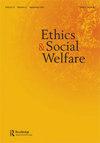“(同伴给)你希望,你也可以改变”:同伴帮助退出街头性交易的女性建立关系
IF 0.9
Q4 SOCIAL WORK
引用次数: 3
摘要
越来越多的研究表明,同伴支持可以促进吸毒和心理健康康复,并降低医疗成本。然而,除了少数例外,同伴支持还没有在街头性交易的背景下进行系统的研究,尽管它对这一弱势群体有潜在的好处。本文通过观察同伴支持对29名曾在街头卖淫的吸毒妇女的影响,填补了这一空白。研究人员从美国东北部一个大城市的五个药物使用问题妇女康复方案中招募妇女进行深入访谈。研究结果表明,同伴支持可以通过提供一个安全、可接受的场所来分享和规范过去的性交易经验,作为榜样,并提供值得信赖的建议,从而促进女性的退出。研究结果强调,在帮助女性退出性交易的项目中,需要同龄人和专业人士之间的合作;他们还强调了提供者在与退出性交易的妇女互动方面的局限性,并强调需要对退出性交易的妇女给予非评判性的关注。本文章由计算机程序翻译,如有差异,请以英文原文为准。
‘[Peers Give] You Hope that You Can Change Too': Peers’ Helping Relationships for Women Exiting Street-based Sex Trade
ABSTRACT A growing body of research demonstrates that peer support can facilitate drug use and mental health recovery and reduce health care costs. However, with few exceptions, peer support has not been systematically studied in the context of street-based sex trade, despite its potential benefits for this vulnerable population. This paper fills this gap by looking at the impact of peer support on 29 substance-use involved women formerly selling sex on the streets. Women were recruited for in-depth interviews from five recovery programmes for women with substance-use problems in a large metropolitan area in Northeast US. Results indicate that peer support can facilitate women's exit by providing a safe and accepting arena to share and normalise past experiences in the sex trade, serving as role models, and providing trustworthy advice. The findings emphasise the need for collaboration between peers and professionals in programmes that assist women exiting the sex trade; they also highlight providers’ limitations in interactions with exiting women, and stress the need for non-judgmental attention to women exiting the sex trade.
求助全文
通过发布文献求助,成功后即可免费获取论文全文。
去求助
来源期刊

Ethics and Social Welfare
SOCIAL WORK-
CiteScore
1.60
自引率
20.00%
发文量
36
期刊介绍:
Ethics and Social Welfare publishes articles of a critical and reflective nature concerned with the ethical issues surrounding social welfare practice and policy. It has a particular focus on social work (including practice with individuals, families and small groups), social care, youth and community work and related professions. The aim of the journal is to encourage dialogue and debate across social, intercultural and international boundaries on the serious ethical issues relating to professional interventions into social life. Through this we hope to contribute towards deepening understandings and further ethical practice in the field of social welfare. The journal welcomes material in a variety of formats, including high quality peer-reviewed academic papers, reflections, debates and commentaries on policy and practice, book reviews and review articles. We actively encourage a diverse range of contributions from academic and field practitioners, voluntary workers, service users, carers and people bringing the perspectives of oppressed groups. Contributions might include reports on research studies on the influence of values and ethics in social welfare practice, education and organisational structures, theoretical papers discussing the evolution of social welfare values and ethics, linked to contemporary philosophical, social and ethical thought, accounts of ethical issues, problems and dilemmas in practice, and reflections on the ethics and values of policy and organisational development. The journal aims for the highest standards in its published material. All material submitted to the journal is subject to a process of assessment and evaluation through the Editors and through peer review.
 求助内容:
求助内容: 应助结果提醒方式:
应助结果提醒方式:


